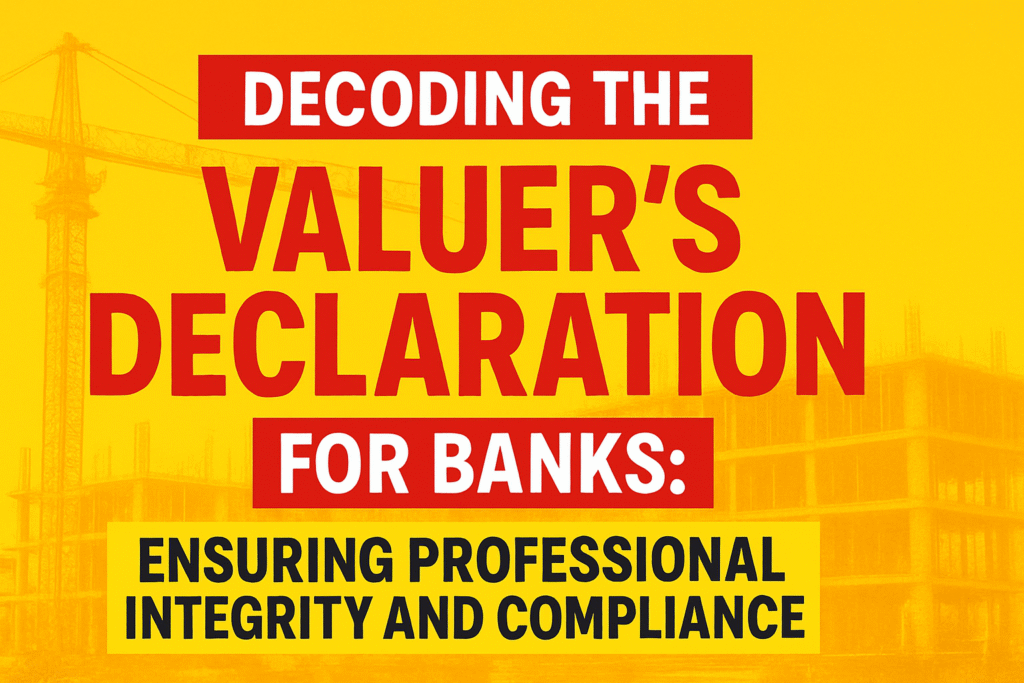MEETING SUMMARY FOR DECODING THE DECLARATION TO BE SIGNED BY THE VALUERS FOR BANKS
Quick recap
The meeting focused on explaining the declaration format required by Union Bank of India for valuers to attach with their valuation reports, emphasizing the importance of truthful and impartial property evaluations. CEV discussed key requirements including accuracy, disclosure of conflicts of interest, and the need for personal property inspections without relying on subcontractors or employees. The discussion concluded with emphasis on understanding and adhering to specific guidelines and standards when signing valuation reports, including compliance with IBA’s handbook, International Valuation Standards, and the Model Code of Conduct for Valuers.
Next steps
- All valuers: Download and read the Handbook on Policy Standards and Procedure for Real Estate Valuation 2011 issued by IBA
- All valuers: Download and read the latest International Valuation Standards 2024 or 2025, including general standards and asset-specific standards relevant to their work
- All valuers: Download and read the Model Code of Conduct for employment of valuers in banks before signing any declaration
- All valuers: Personally inspect every property before signing valuation reports – do not depend on employees or subcontractors for property inspection
- All valuers: Review and modify Point K in the declaration to add “in this valuation report signed by me on ” to confine liability to specific reports
Summary
Union Bank Valuation Declaration Requirements
The meeting discussed the declaration format required by Union Bank of India for valuers to attach with their valuation reports. CEV explained that this declaration is a crucial part of the validation report, as per the format demanded by certain banks. The discussion aimed to inform valuers about this important requirement when providing reports to financial institutions.
Valuer Declaration Requirements Overview
The discussion focused on the declaration requirements for valuers, emphasizing the need for truthful and impartial property evaluations. CEV highlighted key points, including the declaration’s requirement for accuracy, the absence of direct or indirect interest in the property, and the need to disclose any potential conflicts of interest. CEV also stressed the importance of ensuring that the property in question does not belong to any relative, friend, or known person, and that there is no direct or indirect interest in the property value.
Property Valuation Conflict of Interest
CEV discussed the importance of not valuing properties for friends or relatives to avoid conflicts of interest. They emphasized that they personally inspect and value properties, with no subcontracting to other valuers. CEV also highlighted the need for accurate reporting and measurement in property valuations.
Property Inspection and Disclosure Requirements
CEV emphasized the importance of personally inspecting properties and not relying on employees or subcontractors for such inspections. They stressed that any misrepresentation or incorrect identification of properties, including dimensions or directions, should be addressed with office members. CEV also highlighted the need to disclose any previous convictions or misconduct in professional capacity.
Valuation Report Standards Compliance
The discussion focused on the importance of understanding and adhering to specific guidelines and standards when signing valuation reports. CEV emphasized the necessity of familiarizing oneself with the IBA’s handbook on real estate valuation, International Valuation Standards (IVS), and the Model Code of Conduct for Valuers. They highlighted the significance of points F, G, and H in the declaration, which involve conforming to standards, being registered under Section 34AB of the Valuers Act, and agreeing to indemnify the bank against losses. CEV stressed the ethical and professional implications of adhering to these standards and warned against the potential consequences of negligence or misconduct.
DECODING THE DECLARATION TO BE SIGNED BY THE VALUERS FOR BANKS
By the Council of Engineers and Valuers
(For Professional Circulation among Valuers, Chartered Engineers, and Financial Experts)
DECODING THE BANK DECLARATION: ESSENTIAL GUIDELINES FOR VALUERS
CEV EXPERT INSIGHTS
DECODING THE VALUER’S DECLARATION FOR BANKS: ENSURING PROFESSIONAL INTEGRITY AND COMPLIANCE
By: Council of Engineers and Valuers (CEV) & CEV IAF RVO
Special Feature – Valuation Standards and Ethics
The practice of property valuation for financial institutions, particularly banks, carries with it a weight of legal and ethical responsibility. Recent discussions led by the Council of Engineers and Valuers (CEV) and CEV IAF RVO have shed light on one of the most critical yet often misunderstood elements of this process — the Valuer’s Declaration.
The meeting focused on the declaration format required by Union Bank of India, a format that several other banks are also beginning to adopt. This declaration serves as a professional affirmation that the valuer’s assessment is accurate, impartial, and free from conflicts of interest.
Understanding the Core Declaration
The declaration attached to every valuation report is not merely a procedural formality — it represents the valuer’s professional and legal commitment. It includes clauses asserting that:
-
The valuation is accurate and unbiased, based on physical inspection and factual analysis.
-
The valuer has no direct or indirect interest in the property being valued.
-
There exists no conflict of interest with the borrower, owner, or any party to the transaction.
-
The valuer assumes full responsibility for the report and the opinions expressed therein.
CEV emphasized that the declaration must always reflect truthful and independent professional judgment, as it forms part of the official record in banking and legal processes.
The Importance of Personal Inspection
A key takeaway from the meeting was the absolute necessity of personal inspection.
CEV strongly advised valuers against relying on employees or subcontractors for property inspection. Personal verification ensures:
-
Accuracy in identifying the property location, dimensions, and characteristics.
-
Transparency in assessment and documentation.
-
Accountability for the information certified in the valuation report.
The Council warned that failure to conduct personal inspections could expose valuers to disciplinary action, both under bank empanelment norms and regulatory standards.
Compliance with Standards and Codes
CEV reiterated the need for valuers to be fully familiar with and guided by the following key documents:
-
IBA Handbook on Policy, Standards, and Procedure for Real Estate Valuation (2011) – the cornerstone reference for all bank-related valuations.
-
International Valuation Standards (IVS 2024–2025) – setting global benchmarks for consistency, objectivity, and transparency.
-
Model Code of Conduct for Valuers (CEV & IBBI framework) – defining ethical expectations, conflict disclosures, and professional responsibilities.
Valuers were also encouraged to make minor but crucial modifications to Point K of the declaration to add the phrase:
“…in this valuation report signed by me on [date]…”
This ensures that liability is clearly confined to the specific report signed, providing legal clarity while maintaining professional accountability.
Promoting Ethical and Transparent Valuation Practice
The meeting highlighted that declarations are not merely bureaucratic requirements — they are ethical commitments reflecting a valuer’s integrity. CEV underlined that independence and transparency are essential to maintaining the credibility of the valuation profession and the trust of the banking sector.
Valuers were reminded that under IBBI (Valuation) Regulations, professional misconduct in the form of false certification or negligent conduct can lead to severe disciplinary action. Hence, adhering to truthful declarations and thorough procedures is both a professional necessity and a legal safeguard.
Next Steps for Valuers
-
📘 Download & Study the IBA Handbook (2011)
-
📗 Refer to IVS 2024–2025 for updated global standards
-
📕 Understand & Follow the Model Code of Conduct
-
👷 Personally Inspect every property before signing a report
-
✍️ Ensure Declaration Modifications to limit report-specific liability
Now What Next?
The CEV and CEV IAF RVO continue to take proactive steps to strengthen the ethical foundation of the valuation profession in India.
By helping valuers understand the deeper meaning of the bank declaration, the Council ensures that professionalism, independence, and accountability remain at the heart of every valuation report.
Published by: Council of Engineers and Valuers (CEV)




